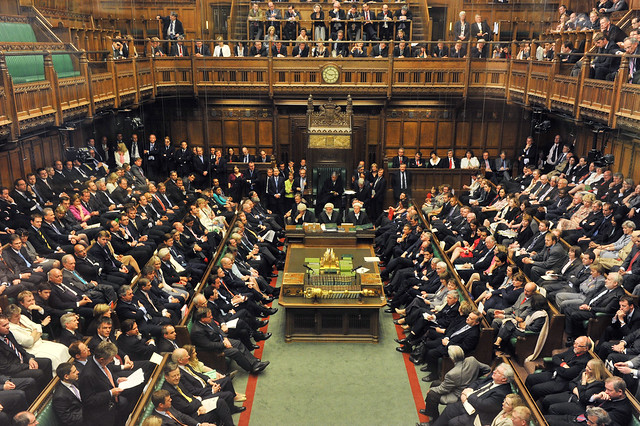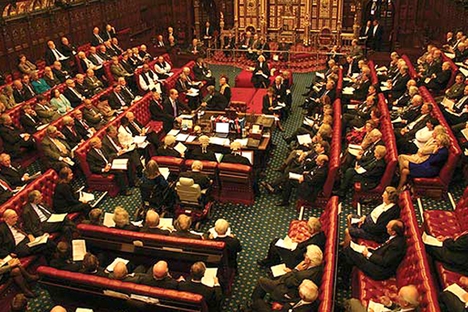To my dismay, the Government's House of Lords Reform Bill is set for its second reading on the coming Monday (9th) and Tuesday (10th of July 2010). [I ought to mention to those who don't know, a Bill is a proposal for a policy to be enacted into law, to put it simply]. This is an incredibly important part of the process of law making. The first reading is merely an announcement of the proposed legislation. The second reading however is the meat and drink of the legislative process: The House of Commons will debate and then vote on the issue. Expect there to be fireworks between what should be a particularly busy House of Commons.
Indeed, unlike other Bills, this is particularly important because it has the potential to change the constitutional framework of the United Kingdom. Now, the United Kingdom doesn't have a written, codified constitution. The United States are of course the prime example of a country that does have such a document, which is often why you hear many controversial issues described in America as "Unconstitutional". The UK, does have a constitution of sorts (that is, an idea of how the country should be run), but it is not found in one place, it is found in several, in Acts of Parliament produced over hundreds of years. Naturally, these Acts of Parliament get old, and Political Parties tend to fight elections on the basis that they need updating. Classic examples would be an Act of Parliament allowing marriage only to be between a man and a woman; many years ago this was fine, but as countries and indeed democracies develop, opinion changes, and in 2005 an updated Act was passed to allow marriage to also be allowed between same-sex couples.
Coming back to the reason for the blog, the three main parties (and this happens very rarely) all agree that the House of Lords needs to be updated to be more aligned to other aspects of the modern political framework. The House of Lords at present is unelected, members exist by virtue of nomination. This is deemed undemocratic by the party machines that exist in the UK. Naturally, the word "undemocratic" is incredibly inflammatory to the public, because often "undemocratic" and "dictatorship" are found very close to each other in the political dictionaries around the world.
Of course, changing it would be great, but I shall highlight three problems with making the House of Lords an elected chamber:
- It will be party dominated - much like the House of Commons, anyone who wants to stand has a better chance if backed by a party. Indeed, anyone can stand for the Commons (famously, Katie Price once stood for election as an MP). However, the electorate tend not to vote for independents and smaller parties. In the bigger picture, they see 1 of at most 3 parties getting into Government, and setting the legislative agenda. A vote for an independent is considered a wasted vote, because of the support that the steam rolling major parties can create. Indeed, the House of Lords at the moment consists of a vast array of intelligent, independent minded members, who contribute massively to the legislative process. People will not go to the polls and vote for Mr Independent on the basis he has contributed massively to medical research (as he would have been nominated to the Lords for). Instead, they will vote for the party, as people do time and time and time again in the House of Commons. The Lords would just mirror the House of Commons in terms of its composition. You think legislation is fastracked through the Lords at the moment? Imagine how quick it would get through, with a Majority in both Commons and the Lords.
- They will have an elected mandate - Gordon Brown as Prime Minister never won an Election as a party leader, hence he was Prime Minister without an "elected mandate" for his Premiership. This damaged his credibility severely, because of the way he inherited his post as PM. Indeed, if the Lords are elected, they will carry an elected Mandate into their role. Great! Wrong. Lords will have been elected in the UK by a proportional system of voting. This is widely accepted as a fairer system, because the amount of votes received tends to equate to the amount of members elected (i,e, if Labour recieve 25% of the vote in the Midlands, expect 25% of Labour candidates from the Midlands to be elected to the Lords). Without wishing to debate the merits and demerits of the system, there is a consensus that a PR system is fairer than the system in place for the House of Commons: a Single-member list system. If members are elected by a fairer system, what is there to stop members saying "Hang on a minute, we're here fairly, you lot [in the House of Commons] have been voted in via safe seats and on 36% of the popular vote, what we say is far more legitimate than what you say!" The point is, the Lords may well get into a position where it is superior to the Commons, which would upset the political system of the UK (the Prime Minister would thus be drawn from the "unfair" House of Commons).
- Loss of expertise - I pose the question, will my University Professor stand if the House of Lords become elected? Well, I did ask him that and he said he wasn't sure. In reality, as a Conservative member of the House of Lords, he would only be able to stand if endorsed by the Party. Punch Lord Norton into Wikipedia, and you will find the quote "the United Kingdom's greatest living expert on Parliament". At the moment, he can weigh in during the legislative process, something i quite like the idea of, particularly if the debate is with regards to anything about our political system. An elected House may well exclude such experts, as indeed its very much down to the parties as to who gets in and who doesn't. It would become a chamber not so much of experts, but loyal party candidates, who are more than willing to vote inline with the party. At present there is a very lax whipping system in the Lords, regardless, there is no majority in the Lords because of the existence of 181 independent cross benches.
Indeed, I would suggest three good arguments, as to why the Lords should be kept as it is.



